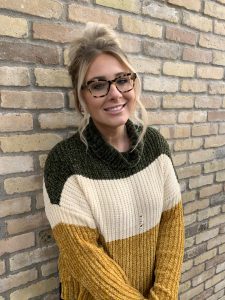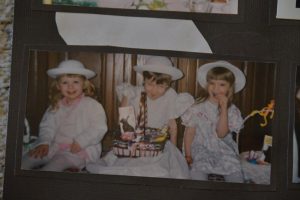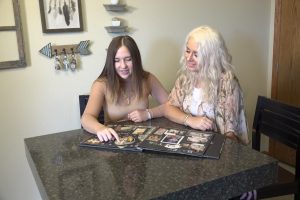Odd one out: A family fights addiction and for each other
October 21, 2020
 Just a day in the life
Just a day in the life
Jenna Washuleski is in her element. Despite the chaos of kids running around at the Boys and Girls Club of Oshkosh, she glides in with a special guest for a H.O.P.E. Group — Hold On, Pain Ends. Montee Ball, former Wisconsin Badger and Denver Bronco running back, came to share his experience with addiction and alcoholism.

Every Tuesday, Jenna facilitates this group for teens to gather and discuss some of the hardships they face in their homes. She created H.O.P.E. Group in February 2019 to provide an outlet for teens to connect with others who have been through similar experiences.
These young people pour their hearts out about how they’ve been impacted by addiction, mental health issues, criminal activity and incarceration.
“I wanted them to have an area where they can relate to other people their age,” Jenna said, smiling at the teenagers playing football in the concourse. “I’ve seen so many students come forward about sharing their story. I want them to gain tools they can apply to their lives, but to do it in a way where we play games and activities or by learning through guest speakers.”
A smiling teenage girl approaches Jenna, showing off her latest artwork from a tattered and worn notebook.
“Hey, that’s really great,” Jenna said, as she flips through the notebook. “How is everything going?”
“Good. I just got a job here at the Boys and Girls Club, so I might not be able to make it to H.O.P.E. much anymore,” the teen said.
“That’s OK,” Jenna said. “I’m glad you’re taking steps to better yourself.”
Jenna is always delighted when she sees her club members succeeding. These teens all share a common experience — they all come from difficult lives where they need support, such as living with family members who struggle with addiction.
Jenna knows what they are going through. She knows what it’s like to grow up in an environment full of addicts and abuse. She knows what it’s like to use. And she knows what it’s like to move past the addiction that still affects her family to this day.
Getting the call
The call came in the morning when Jenna was finally relaxing in bed after a 14-hour workday, starting first as a substance abuse counselor and then as a waitress. She didn’t want to look at the Caller ID.
“Please, please, don’t let it be about my sisters,” she thought. Jenna often didn’t know where either of her sisters was. They could be in jail. They could be in the hospital from an overdose. They could be anywhere.
She tried to ignore the ringing, but, as always, she couldn’t. She’s the responsible sister. She always picked up.
One week earlier, Jenna had reached out to Carly, her older sister, and asked if she needed help. Carly had said no then.
“I changed my mind. I decided I need you to take Makayla,” Carly said.
Jenna went on high alert. “OK, when?”
“Tomorrow.”
Jenna thought to herself, ‘Oh my God, tomorrow?’ “Are you serious? OK.”
That “tomorrow” was Sept. 16, 2017 when Jenna, then 26, took her then 13-year-old niece, Makayla, into her home in Fond du Lac because her sister, who struggles with addiction and mental health disorders, couldn’t care for her. Jenna knew, at that moment, her life would be changed forever.
Winnebago County sees dozens of overdose deaths each year. In 2018, 24 people lost their lives because of opioids and other addictive substances. The year before, 34 died from opiate overdoses.
Jenna plays an active role in helping those who are willing to develop a life in recovery. She does this through her profession as a counselor, as a member of the steering team and chair of the Prevention and Awareness Action Team for Breakwater, formerly called the Winnebago County Drug and Alcohol Coalition, as a board member at Solutions Recovery, Inc. and at the Boys and Girls Club of Oshkosh through H.O.P.E. Group.
The early years
Jenna was only 1 when her father left for work and never returned. Her sisters, Leah and Carly, were 3 and 5, respectively. Their mother, overwhelmed with being a single mom and learning to balance working third-shift with schoolwork, struggled to cope.

The hardship of raising three children alone with little support became too much; she lost custody and spent four months in jail on charges of child abuse. Jenna and Leah, then 5 and 7, went into foster care; Carly, the oldest at 9, lived with their grandmother.
After a year apart, they reunited as a family. However, the scars of losing their mother and being put into foster care remained. Leah and Carly began abusing addictive substances, starting with prescribed medications: Ritalin, Adderall and Xanax. Leah used weed and drank alcohol at 12, which progressed to opioids, and then to meth when she was 28. Carly did ecstasy for three years when she was 22, which progressed to heroin use, then cocaine at 30.
“When I was in middle school, I remember seeing [my sisters] experimenting with drugs and smoking, drinking and partying at our house when my mom wasn’t home,” Jenna said. “They engaged in criminal activity — robbing our neighbors, stealing cars, ending up on supervision and the bracelet.” The “bracelet” is a court-ordered tracking device for people who have been convicted of a crime.
Both Leah and Carly have been arrested for various charges. Some of Leah’s charges include possession of methamphetamine, possession of narcotic drugs and battery. For Carly, the charges include neglecting a child, disorderly conduct and theft.
Jenna, somehow, was different from her sisters. She was living a double life between school and home.
At school, she maintained good grades and participated in extracurricular activities. At home, she experimented with drugs and alcohol with her sisters, to try to stay close with them.
During her junior year of high school, Jenna began to distance herself from her family. She didn’t want to follow her sisters down the path of addiction. Their experiences drove Jenna’s desire to help others, so she went to college while her sisters were still active in their addiction.
“I went to class and we were talking about heroin. It was the day after I found out my sister Leah was doing heroin. It was really difficult to go to class and learn about these things as I am finding out that is what my sister is doing.” Jenna learned that creating healthy boundaries was her next step.
The break-in
“Jenna, come with us,” Leah whispered.
“What are we doing?”
“We’re going to break into the neighbor’s place.”
Jenna didn’t really want to go, but she wanted to be closer to her sisters. She’s the quintessential little sister who just wants to fit in. She was a good student, an athlete and was well-liked at school. Her sisters were rebellious, angry and sometimes violent with each other and with her. They reveled in the adrenaline rush they got from doing illegal things.
Jenna knew her sisters were taking drugs — she avoided all that, seeing how the drugs affected them. That was, until sophomore year in high school.
Leah would take Jenna to local concerts in Fond du Lac. At those concerts, Leah would hand her pills — they ranged from Oxycontin, Xanax, Adderall, to Methadone and more — and say, “Here Jenna, try this.”
And Jenna did.
When the effects settled in, she felt nauseous. She didn’t like the way the drugs made her feel, but she kept doing them because it built a bond between her and her sister.
As a teenager, Jenna knew taking random pills was bad, but she tried not to think too much about it. She and her sisters were getting along — something she wanted her entire life.
Then came the break-in. Jenna and her sisters went to a neighbor’s house and climbed through an open window. They weren’t looking for anything in particular, but they all ran around and grabbed random things they thought might be of value. Everyone except for Jenna, she just stood there.
‘This is stupid, why am I here?’ Jenna thought. Fear raced through her body, but a sound from upstairs had broken her paralysis.
“Jenna, come here. You gotta see this!” It was Carly and Leah.
She slowly made her way up the stairs to a room where the sisters were huddled around a closet. As she got closer, Jenna realized that the homeowners were growing marijuana. That was the first time Jenna saw a marijuana plant.
Someone grabbed the plant and shouted, “Jenna, come on! We gotta get out of here!”
Jenna quickly followed. She thought, ‘What am I doing here? I don’t want to be like this.’
While her sisters continued using drugs and alcohol, Jenna stopped and continued the push to complete her high school education. Both Leah and Carly did not earn their diplomas the traditional way, as they had children at a young age.
“When Makayla moved in with me, I was going to college to get my bachelor’s degree in psychology. I already had my degree for substance abuse counseling, so I was working as a counselor, waitressing, and going to school full-time. The next thing you know, I am taking on a teenager. I put school on hold and quit my waitressing job so I could take care of her.”
The overdose
The text came on a Friday afternoon.
“Is there any chance we can reschedule the interview? I want to hang out with a friend I haven’t seen in a long time,” Carly sent.
“Yeah, it’s no problem,” Jenna replied.
Breakwater, formerly the Winnebago County Drug and Alcohol Coalition, was doing a project called “Live Stories” that interviewed people from all walks of life who were impacted by addiction. Jenna knew her family’s story would be perfect for the project. Jenna, her niece Makayla, and Makayla’s mother, Carly, signed up to participate.
When Carly backed out, Jenna spent the day with Makayla and Makayla’s grandmother, being interviewed for the Live Stories project. They ended the long day of interviews with a pizza dinner, then she and Makayla went home.
The very next day, May 19, 2018, Jenna’s mom called. Carly had overdosed on heroin she got from her former dealer and ex-husband in Waupun. Her lungs were deflating — it took three shots of Narcan to revive her. Doctors found a tear in her heart and told her if she kept using, she would die.
Jenna had mentally prepared herself for that phone call for years.
She thought to herself, ‘How am I going to tell my niece that her mom had overdosed?’
Both Jenna and Makayla knew better than to think that the struggles of substance abuse disorders could be fixed in a snap. Still, Jenna knew that when it happened, she had to distance herself, and Makayla, from Carly in order for them to focus on their own mental health and self-care.
More on Makayla
Since Sept. 16, 2017, Jenna has been the de facto parent to Makayla, Carly’s daughter, who now attends high school in Fond du Lac County.
Jenna obtained “kinship” of Makayla in October of 2017. This was done over guardianship because Jenna did not want to see Carly completely lose Makayla. According to the Department of Children and Families, “kinship” refers to “helping a family support a child in the home of a relative that might be under stress or when the child has experienced abuse or neglect.”

Makayla, who was 13 at the time, was struggling to find a place to live after she and her mother were evicted from their rental home.
Makayla had been sleeping on the couches of her mom’s friends’ homes. She also spent a week living with her pastor and his family. Her mother, despite her drug addiction, managed to pull herself together and call Jenna for help.
For about a month, from September to October, Jenna, who was living in Fond du Lac, would take Makayla to school in Ripon each day, then head to work in Oshkosh. Then she would drive back to Ripon to pick Makayla up from school, then back home to Fond du Lac.
That was around 100 miles per day, about two hours on the road. So she quit one of her jobs and moved to Ripon, where Makayla was attending the eighth grade. Jenna had to put her education on hold before the fall 2017 semester began at UW Oshkosh to take care of Makayla.
“When she moved in with me, we didn’t know how long it was going to be for and we didn’t know what was happening. I just took her,” she said.
This was new for both Jenna and Makayla. It was a rough start, but the two of them worked it out. They sat down and created rules and guidelines for each other.
“I just kept pushing through it because that’s what you have to do in that kind of situation. You have to make it work, especially with Makayla. I had to do what needed to be done,” Jenna said. “So although it was very difficult, it’s very rewarding seeing the person that she’s become.”
These days, Jenna and Makayla like to hang out playing board games and listening to music in their tidy two-bedroom apartment.
Succulents are displayed around the living room and the ambiance radiates a positive feel. Motivational posters hang on the walls around the small space. Everything is clean, pristine and elegant. There is no TV in their living room. It’s a space to create closer connections.
Life today
Jenna knows there is always something good that comes out of hard work, dedication and focusing on what can benefit a healthy lifestyle. Her job as a substance abuse counselor, and the relationship she fostered with Makayla, has allowed her to create boundaries and guide her sisters in the right direction.
Makayla has talked with her mother about how she does not want to move back in with her. Carly was supportive and understanding of her decision.
Reflecting on how her upbringing was quite rough, Jenna realizes she wouldn’t be where she is today without it.
“Although their struggles have caused a lot of hardships for our family, I’ve turned those into a positive. Their addiction gives me an opportunity to be a better professional and to give back to the community,” Jenna said.
Having grown up with two sisters who struggled with addiction, Jenna has learned to take life and all of its ups and downs in stride.
“There’s always something,” she said. “You get a phone call and you’re not even surprised anymore of what you’re going to hear on the other end, because you’re normalized to the chaos. Another thing that’s pretty hard to talk about is that there were times that I’ve already accepted that they’re going to die from this. As a result, I decided I don’t want children because I fear that they could also struggle with an addiction like many members of my family. I don’t want to spend my entire life worried about things like how I didn’t want my sisters to know where I lived, or leave them alone with my purse, because I couldn’t trust them. It does feel really good now that they are doing well, and I don’t have to worry so much about those things.”
Now that both Leah and Carly are on their way to recovery, Jenna said she and Makayla have an opportunity to focus on themselves.
“We’re relieved because we can finally just sit back, relax and not worry about that phone call or what’s going to happen next,” Jenna said. “We know that they’re both safe, getting treatment and getting the help they need.”
Looking back, Jenna also realizes that her relationship with Makayla has played a big part in who she is today.
“People ask me how I turned out so differently. I believe everything happens for a reason,” she said. “Now that I reflect back on everything, I think me needing to be there for Makayla was a huge part of that. I was in a good place to be there for her and take care of her when it was needed, and that’s probably the most important thing I’ve ever done in my life.”













